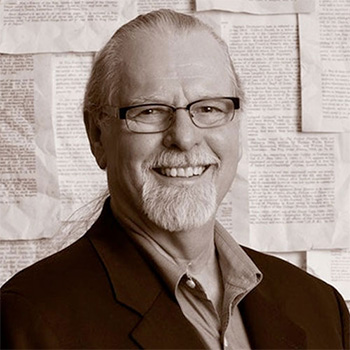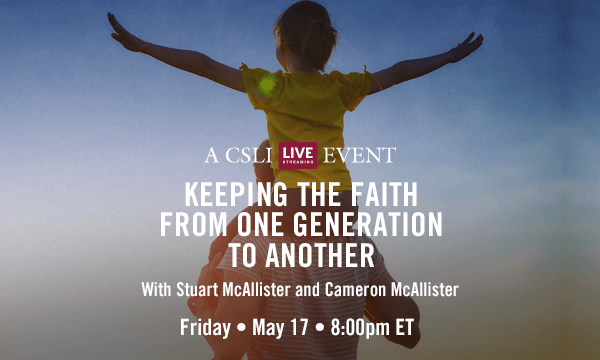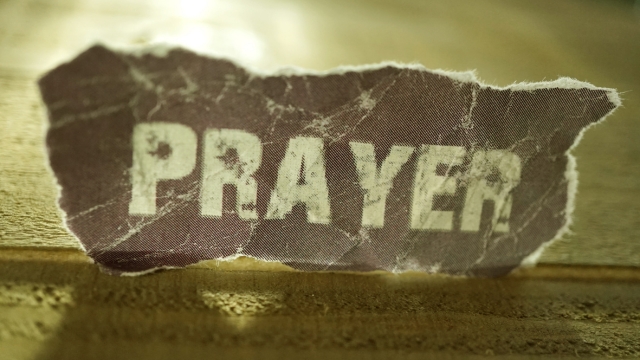Back to series



Crucifying Our Will
As we are learning to pray we discover an interesting progression. In the beginning our will is in struggle with God’s will. We beg. We pout. We demand. We expect God to perform like a magician or shower us with blessings like Father Christmas. We major in instant solutions and manipulative prayers.
In time, however, we begin to enter into a grace-filled releasing of our will and a flowing into the will of the Father. It is the prayer of relinquishment that moves us from the struggling to the releasing.
The School of Gethsemane
We learn the prayer of relinquishment in the school of Gethsemane. Gaze in adoring wonder at the scene. The solitary figure etched against gnarled olive trees. The bloodlike sweat falling to the ground. The human longing: “Let this cup pass.” The final relinquishment: “Not my will, but yours be done” (Lk. 22:39-46). We do well to meditate often on this unparalleled expression of relinquishment.
Here we have the incarnate Son praying through His tears and not receiving what He asks. Jesus knew the burden of unanswered prayer. He really did want the cup to pass, and He asked that it would pass. “If you are willing” was His questioning, His wondering. The Father’s will was not yet absolutely clear to Him. “Is there any other way?” “Can people be redeemed by some different means?” The answer—no! Andrew Murray writes, “For our sins, He suffered beneath the burden of that unanswered prayer.”
 Here we have the complete laying down of human will. The battle cry for us is, “My will be done!” rather than, “Thy will be done.” We have excellent reasons for the banner of self-will: “Better for me than them to be in control. Besides, I would use the power to such good ends.” But in the school of Gethsemane we learn to distrust whatever is of our own mind, thought, and will, even though it is not directly sinful. Jesus shows us a more excellent way. The way of helplessness. The way of abandonment. The way of relinquishment. “My will be done” is conquered by “not my will.”
Here we have the complete laying down of human will. The battle cry for us is, “My will be done!” rather than, “Thy will be done.” We have excellent reasons for the banner of self-will: “Better for me than them to be in control. Besides, I would use the power to such good ends.” But in the school of Gethsemane we learn to distrust whatever is of our own mind, thought, and will, even though it is not directly sinful. Jesus shows us a more excellent way. The way of helplessness. The way of abandonment. The way of relinquishment. “My will be done” is conquered by “not my will.”
Here we have the perfect flowing into the will of the Father. “Your will be done” was Jesus’ consuming concern. To applaud the will of God, to do the will of God, even to fight for the will of God is not difficult until it comes at cross-purposes with our will. Then the lines are drawn, the debate begins, and the self-deception takes over. But in the school of Gethsemane we learn that “my will, my way, my good” must yield to higher authority.
The Necessity of Struggle
We must not, however, get the notion that all of this comes to us effortlessly. That would not even be desirable. Struggle is an essential feature of the prayer of relinquishment. Did you notice that Jesus asked repeatedly for the cup to pass? Make no mistake about it: He could have avoided the cross if He had so chosen. He had a free will and a genuine choice, and He freely chose to submit His will to the will of the Father.
It was no simple choice or quick fix. Jesus’ prayer struggle—replete with bloody sweat—lasted long into the night. Relinquishment is no easy task.
All of the luminaries in Scripture struggled as well: Abraham as he relinquished his son, Isaac; Moses as he relinquished his understanding of how the delivered of Israel should function; David as he relinquished the son given to him by Bathsheba; Mary as she relinquished control over her future; Paul as he relinquished his desire to be free of a debilitating “thorn in the flesh.”
Struggle is important because the prayer of relinquishment is Christian prayer and not fatalism. We do not resign ourselves to fate. We are not locked into a preset, determinist future. Ours is an open, not a closed, universe. We are “co-laborers with God,” as the Apostle Paul put it—working with God to determine the outcome of events. Therefore our prayer efforts are a genuine give and take, a true dialogue with God—and a true struggle. Severing Precious Roots
When I wrote these words, my wife, Carolynn, and I were personally experiencing the prayer of relinquishment. A prophetic utterance had been spoken over me, the first half of which related to our family and had been occurring in the most encouraging and faith-building ways. The second half of this message had to do with some deep trials we would go through that would result in our being catapulted into a new realm of effective ministry.
I did not know what to think of the last part of this message until I received an unusual revelation from God, the gist of which indicated that I would be severing some very precious roots in my life. At first I misunderstood these words, assuming that they referred to my relationship with a small group of writers I was with at the time. (The fact that God speaks to us is no guarantee that we hear or understand correctly!) In time I came to see that God was speaking about our deep roots in the city where we lived and the university where I taught. This was confirmed by numerous circumstances and the wise counsel of many from around the country.
But it was only the beginning of our experience of the prayer of relinquishment. We were releasing far more than the warm friendships of more than a dozen years, far more than the base from which to operate our new renewal effort, Renovaré.
I was the executive director of a small fellowship of writers called The Milton Center. I founded this center in the 1980s, and I continued to have very high hopes for its future. I was having to relinquish it. For years Carolynn and I had dreamed of building a toxin-free home in hopes of gaining an upper hand over her rather severe allergies. Carolynn spent one entire year designing and overseeing the building of the house. We had moved in only recently. We were having to relinquish it. And so much more.
These decisions did not come easily. We prayed. We struggled. We wept. We went back and forth, back and forth, weighing option after option. We prayed again, struggled again, wept again. Believe me, we tangled with God plenty over that decision. At the time of this writing [1991] we did not know what all this would mean, but our relinquishment was a full and wholehearted agreement with God that His way is altogether right and good.
Release with Hope
The prayer of relinquishment is a bona fide letting go, but it is a release with hope. We have no fatalist resignation. We are buoyed up by a confident trust in the character of God. Even when all we see are the tangled threads on the backside of life’s tapestry, we know that God is good and is out to do us good always. That gives hope to believe that we are the winners, regardless of what we are being called upon to relinquish. God is inviting us deeper in and higher up. There is training in righteousness, transforming power, new joys, deeper intimacy.
Sometimes the very thing we relinquish is given back to us. This does not always happen, of course. There are times when the release is permanent. At such times we are to trust in the wisdom of God and ask for the grace to rest in His peace. A settled peace, in fact, is the most frequent experience of those who have trod the path of relinquishment.
 But, as I said, the very thing we release is sometimes returned to us. Why would God take us through such a roller-coaster process? Why, for example, did Jesus say, “Unless a grain of wheat falls into the earth and dies, it remains just a single grain; but if it dies, it bears much fruit” (Jn. 12:24, NRSV)? Why does God seemingly require relinquishment before bringing something into being?
But, as I said, the very thing we release is sometimes returned to us. Why would God take us through such a roller-coaster process? Why, for example, did Jesus say, “Unless a grain of wheat falls into the earth and dies, it remains just a single grain; but if it dies, it bears much fruit” (Jn. 12:24, NRSV)? Why does God seemingly require relinquishment before bringing something into being?
Part of the answer lies in the fact that frequently we hold on so tightly to the good that we do know that we cannot receive the greater good that we do not know. God has to help us let go of our tiny vision in order to release the greater good He has in store for us.
A Priceless Treasure
But this is only a partial answer. The fuller answer lies in the purposes of God in transforming the human personality. Relinquishment brings to us a priceless treasure: the crucifixion of the will. Paul knew what a great gift this is. “I have been crucified with Christ,” he joyfully announced. There is relinquishment. There is crucifixion. There is death to the self-life. But there is also a releasing with hope: “It is no longer I who live, but Christ who lives in me; and the life I now live in the flesh I live by faith in the Son of God, who loved me and gave himself for me” (Gal. 2:19-20, RSV).
John Woolman, the Quaker tailor who did so much to remove slavery from the American continent, once had a dramatic vision in which he “heard a soft, melodious voice, more pure and harmonious than any I had heard with my ears before: I believed it was the voice of an angel who spoke to other angels. The words were, John Woolman is dead.” Woolman was very puzzled over these words and sought to “get so deep that I might understand this mystery.” Finally he “felt divine power prepare my mouth,” and he declared, “I am crucified with Christ....Then the mystery was opened, and I perceived...that the language John Woolman is dead meant no more than the death of my own will.”
“The death of my own will”—strong language. But all of the great devotional masters have found it so. Soren Kierkegaard echoes Woolman’s experience when he notes, “God creates everything out of nothing—and everything which God is to use He first reduces to nothing.”
Do you know what a great freedom this crucifixion of the will is? It means freedom from what A. W. Tozer called “the fine threads of the self-life, the hyphenated sins of the human spirit.” It means freedom from the self-sins: self-sufficiency, self-pity, self-absorption, self-abuse, self-aggrandizement, self-castigation, self-deception, self-exaltation, self-depreciation, self-indulgence, self-hatred, and a host of others just like them. It means freedom from the everlasting burden of always having to get our own way. It means freedom to care for others, to genuinely put their needs first, to give joyfully and freely.
Little by little, we are changed by this daily crucifixion of the will. Changed, not like a tornado changes things, but like a grain of sand in an oyster changes things. New graces emerge: new ability to cast all our cares upon God, a new joy at the success of others, new hope in a God who is good.
Please remember, we are dealing with the crucifixion of the will, not the obliteration of the will. Crucifixion always has resurrection tied to it. God is not destroying the will but transforming it so that over a process of time and experience we can freely will what God wills. In the crucifixion of the will we are enabled to let go of our tightfisted hold on life and follow our best prayers.
The Practice of Prayer
Only through the specifics of daily life can you be led into the prayer of relinquishment. The will is surrendered moment by moment as you face the ordinary decisions of home, family, and job. I cannot prescribe for you how this is done. In fact, you will not know the shape of relinquishment until specific issues arise. So the practice will come through lived experience. I am able, however, to give you some practiced prayers that you then can interpret into your individual situation.

First, learn the prayer of self-emptying. Meditatively pray though Philippians 2, which describes the kenosis, the self-emptying of Christ, who was in the form of God but who voluntarily took on the form of a servant and became obedient to the point of death. Bid the brooding Spirit of God to apply your prayer to the specifics of your day. Wait quietly. Listen carefully. Obey immediately.
Second, learn the prayer of surrender. Using any of the synoptic Gospels, go with Jesus into the Garden. Stay awake and watch. See His sorrowing soul. Let your heart be saddened too. Struggle with Him in seeking other options, hoping to avoid the cup. Now, speak His words as your own: “Not my will, but yours be done.” Invite the resurrected One to interpret the words into your life, your family, your vocation.
Third, learn the prayer of abandonment. De Caussade’s book Self-Abandonment to Divine Providence may be helpful. You might want to use the words of Charles de Foucauld: “Father, I abandon myself into Your hands; do with me what You will. Whatever You may do, I thank You: I am ready for all, I accept all. Let only Your will be done in me, and in all Your creatures—I wish no more than this, O Lord.” Allow the Sovereign of your heart to specify what needs to be laid at His feet.
Fourth, learn the prayer of release. First, lift up into His arms your children, your spouse, your friends. Next, place into His loving care your future, your hopes, your dreams. Finally, hold up to Him your enemies, your angers, your desire for retaliation. Give it all into His hands and then turn around and walk away. He will care for everything as He sees fit.
Fifth, learn the prayer of resurrection. “Lord,” you may pray, “bring back to life what will please You and advance Your kingdom. Let it come in whatever form You desire. Let it be in Your time and Your way. Thank You, Lord, for resurrection.” Some things will remain dead—it is better for you that they do. Others will burst forth into new life in such a way that you will hardly recognize them. In either case, rest in the confidence that God is better than you are at resurrection.
Just the Beginning
Our sojourn into the prayer of relinquishment has only begun. We have so much to learn, so far to go. Relinquishment takes us into rugged terrain. The climb is steep, the rocks are sharp, and the trail passes by precarious ridges. From every human viewpoint, at times it looks like we have fallen over the precipice to our death. But we know better. We know that we are only falling into the arms of Jesus, fully satisfied, fully at rest.

Richard Foster
TheologianRichard Foster is a Christian theologian and author. He is founder of Renovaré (a Christian nonprofit established in1988 to help people in becoming more like Jesus) and served as its president until 2008; he continues to serve in an advisory role. Foster has been a professor at Friends University and pastor of Evangelical Friends churches. He earned his Doctor of Pastoral Theology at Fuller Theological Seminary and received an honorary doctorate from Houghton College. He is possibly best known for his 1978 book Celebration of Discipline, which sold over one million copies. It was named by Christianity Today as one of the top ten books of the 20th century.

 COPYRIGHT: This publication is published by C.S. Lewis Institute; 8001 Braddock Road, Suite 301; Springfield, VA 22151. Portions of the publication may be reproduced for noncommercial, local church or ministry use without prior permission. Electronic copies of the PDF files may be duplicated and transmitted via e-mail for personal and church use. Articles may not be modified without prior written permission of the Institute. For questions, contact the Institute: 703.914.5602 or email us.
COPYRIGHT: This publication is published by C.S. Lewis Institute; 8001 Braddock Road, Suite 301; Springfield, VA 22151. Portions of the publication may be reproduced for noncommercial, local church or ministry use without prior permission. Electronic copies of the PDF files may be duplicated and transmitted via e-mail for personal and church use. Articles may not be modified without prior written permission of the Institute. For questions, contact the Institute: 703.914.5602 or email us.
-
Recent Podcasts
A Welcome Change in Apologetics
by Randy Newman, Aimee Riegert on April 19, 2024We’re burdened for our friends who don’t know...Read More
-
Questions That Matter Podcast – Samuel James and Digital Liturgies
by Samuel James, Randy Newman on April 19, 2024
-
The Side B Stories – Dr. James Tour’s story
by Jana Harmon, James Tour on April 12, 2024
-
Recent Publications
Isn’t Morality Relative?
by Christopher L. Reese on April 1, 2024It is widely accepted in the Western world...Read More
-
Do Muslims and Christians Worship the Same God?
by Andy Bannister on March 1, 2024
-
Artificial Intelligence and Its Impacts on Humanity
by John Lennox on February 13, 2024
0
All Booked
0.00
All Booked
0.00
All Booked
22140
GLOBAL EVENT: Keeping the Faith From One Generation To Another with Stuart McAllister and Cameron McAllister, 8:00PM ET
https://www.cslewisinstitute.org/?event=global-event-keeping-the-faith-from-one-generation-to-another-with-stuart-mcallister-and-cameron-mcallister-800pm-et&event_date=2024-05-17®=1
https://www.paypal.com/cgi-bin/webscr
2024-05-17

Next coming event
Days
Hours
Minutes
Seconds
GLOBAL EVENT: Keeping the Faith From One Generation To Another with Stuart McAllister and Cameron McAllister, 8:00PM ET
On May 17, 2024 at 8:00 pmSpeakers

Richard Foster
Theologian
Team Members

Richard Foster
TheologianRichard Foster is a Christian theologian and author. He is founder of Renovaré (a Christian nonprofit established in1988 to help people in becoming more like Jesus) and served as its president until 2008; he continues to serve in an advisory role. Foster has been a professor at Friends University and pastor of Evangelical Friends churches. He earned his Doctor of Pastoral Theology at Fuller Theological Seminary and received an honorary doctorate from Houghton College. He is possibly best known for his 1978 book Celebration of Discipline, which sold over one million copies. It was named by Christianity Today as one of the top ten books of the 20th century.





